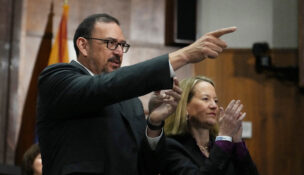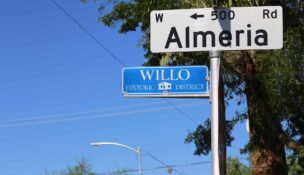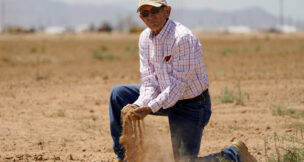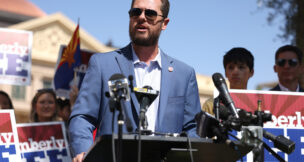Arizona governor defends utility financing bill despite APS clean energy setback
Reagan Priest Arizona Capitol Times//August 12, 2025//
Arizona governor defends utility financing bill despite APS clean energy setback
Reagan Priest Arizona Capitol Times//August 12, 2025//
Key Points:
-
Arizona Public Service walks back plan to exit coal energy by 2031
-
Advocacy groups say the company’s delayed exit from coal defeats the purpose of bill
-
APS said the securitization legislation can still be used on other assets, including those damaged by natural disasters
Gov. Katie Hobbs and Arizona Public Service are defending a controversial utility financing bill set to take effect in September after advocacy groups say the company’s delayed exit from a coal-fired power plant defeats the purpose of the bill.
On August 7, APS announced it would roll back its clean energy commitments — including its plans to use zero coal by 2031 — in favor of energy affordability and reliability. That move sheds new light on the utility’s efforts earlier this year to lobby for securitization legislation, citing the need for state assistance in the upcoming closure of the coal-burning Four Corners Generating Station.
Securitization allows utility companies to transfer debt into low-interest bonds that can be sold to recoup funding from aging assets, like decades-old coal plants. But advocacy groups say APS should not have pushed for House Bill 2679, signed in May, if the company knew its coal exit would be delayed.
“It wasn’t a good bill, and it won’t be a good law,” said Sandy Bahr of the Sierra Club. “… we said ‘you should not push this through this session … have real stakeholder meetings, a real process so we can hash out these issues.’ And APS basically made it seem like they needed it right away.”
Christian Slater, Hobbs’ spokesman, said the governor disagreed with APS’ decision to walk back its clean energy goals, but said securitization is still a necessary tool for utility companies.
“The securitization bill signed by Governor Hobbs still helps Arizona build more clean energy while guaranteeing lower costs and delivering even more energy,” Slater said in a statement. “The latest announcement has nothing to do with the merits of securitization.”
Some lawmakers said they were led to believe APS needed the legislation sooner rather than later because of its planned 2031 exit from Four Corners. But now, the company says it plans to exit the plant “no later than 2038,” when its lease on Navajo Nation land is up.
Mike Philipsen, a spokesperson for APS, echoed Hobbs’ defense of the bill, saying it could be used to recoup costs in other situations. He also noted that APS has not yet decided whether it will operate Four Corners past 2031.
“HB 2679 enables utilities to save customers money by refinancing costs across a range of circumstances,” Philipsen said in a statement. “While some of those circumstances involve infrastructure retired before all investment costs have been fully recovered, other circumstances are forward-looking or address facilities that may be damaged or destroyed by natural disasters, such as wildfires or extreme storms. APS will carefully examine opportunities to use this tool to maximize bill savings for customers while ensuring continuous, reliable service.”
Groups like Chispa Arizona, the Arizona Public Interest Research Group and the Arizona Solar Energy Industries Association criticized APS for rolling back its clean energy commitments. Some groups said the company misled lawmakers about the need for securitization legislation and even encouraged Hobbs and the Legislature to repeal it.
HB2679 faced intense opposition from Democrats, environmentalists and consumer advocacy groups during its journey through the Legislature. The bill was written by APS and given to Rep. Gail Griffin, R-Hereford, to sponsor without any stakeholder involvement or input from the Arizona Corporation Commission during drafting.
Attorney General Kris Mayes even argued that the bill could violate the state’s constitution, and is currently reviewing its legality as part of a formal attorney general’s opinion.
Despite the concerns, Hobbs signed the bill, noting that it had gone through a significant amendment process and was made better by her office’s input.
APS has not said whether its plan to exit Four Corners will include decommissioning the two remaining generators or selling the plant to another company or group that will keep it online. Senate Minority Leader Priya Sundareshan attempted to limit HB 2679 to retired assets in the amendment process for that reason, but was unsuccessful.
Four Corners is the last coal-fired plant operated by APS after the closure of the Cholla Power Plant earlier this year. It has stakes in coal plants operated by other utility companies in Arizona, but some of those plants could be transitioned to natural gas in the future.
HB 2679 won’t become law until late September, and it is currently unclear when any of Arizona’s utility companies will use it.














































